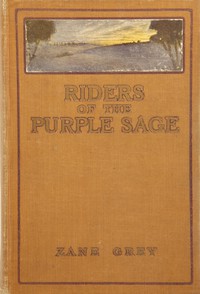The Desert of Wheat by Zane Grey (top 100 books to read .txt) 📖

- Author: Zane Grey
Book online «The Desert of Wheat by Zane Grey (top 100 books to read .txt) 📖». Author Zane Grey
"So there, boys, you have a little bit of American fightin' come home to you, straight an' true. I say that's what the Germans have roused. Well, it was a bad day for them when they figgered everythin' on paper, had it all cut an' dried, but failed to see the spirit of men!"
Lenore tore herself away from the window so that she could not hear any more, and in the darkness of her room she began to pace to and fro, beginning to undress for bed, shaking in some kind of a frenzy, scarcely knowing what she was about, until sundry knocks from furniture and the falling over a chair awakened her to the fact that she was in a tumult.
"What—am I—doing!" she panted, in bewilderment, reaching out in the dark to turn on the light.
Like awakening from a nightmare, she saw the bright light flash up. It changed her feeling. Who was this person whose image stood reflected in the mirror? Lenore's recognition of herself almost stunned her. What had happened? She saw that her hair fell wildly over her bare shoulders; her face shone white, with red spots in her cheeks; her eyes seemed balls of fire; her lips had a passionate, savage curl; her breast, bare and heaving, showed a throbbing, tumultuous heart. And as she realized how she looked, it struck her that she felt an inexplicable passion. She felt intense as steel, hot as fire, quivering with the pulsation of rapid blood, a victim to irrepressible thrills that rushed over her from the very soles of her feet to the roots of her hair. Something glorious, terrible, and furious possessed her. When she understood what it was she turned out the light and fell upon the bed, where, as the storm slowly subsided, she thought and wondered and sorrowed, and whispered to herself.
The tale of Dorn's tragedy had stirred to the depths the primitive, hidden, and unplumbed in the unknown nature of her. Just now she had looked at herself, at her two selves—the white-skinned and fair-haired girl that civilization had produced—and the blazing, panting, savage woman of the bygone ages. She could not escape from either. The story of Demon Dorn's terrible fight had retrograded her, for the moment, to the female of the species, more savage and dangerous than the male. No use to lie! She had gloried in his prowess. He was her man, gone out with club, to beat down the brutes that would steal her from him.
"Alas! What are we? What am I?" she whispered. "Do I know myself? What could I not have done a moment ago?"
She had that primitive thing in her, and, though she shuddered to realize it, she had no regret. Life was life. That Dorn had laid low so many enemies was grand to her, and righteous, since these enemies were as cavemen come for prey. Even now the terrible thrills chased over her. Demon Dorn! What a man! She had known just what he would do—and how his spiritual life would go under. The woman of her gloried in his fight and the soul of her sickened at its significance. No hope for any man or any woman except in God!
These men, these boys, like her father and Jake, like Dorn and his comrades—how simple, natural, inevitable, elemental they were! They loved a fight. They might hate it, too, but they loved it most. Life of men was all strife, and the greatness in them came out in war. War searched out the best and the worst in men. What were wounds, blood, mangled flesh, agony, and death to men—to those who went out for liberation of something unproven in themselves? Life was only a breath. The secret must lie in the beyond, for men could not act that way for nothing. Some hidden purpose through the ages!
Anderson had summoned a great physician, a specialist of world renown. Lenore, of course, had not been present when the learned doctor examined Kurt Dorn, but she was in her father's study when the report was made. To Lenore this little man seemed all intellect, all science, all electric current.
He stated that Dorn had upward of twenty-five wounds, some of them serious, most trivial, and all of them combined not necessarily fatal. Many soldiers with worse wounds had totally recovered. Dorn's vitality and strength had been so remarkable that great loss of blood and almost complete lack of nourishment had not brought about the present grave condition.
"He will die, and that is best for him," said the specialist. "His case is not extraordinary. I saw many like it in France during the first year of war when I was there. But I will say that he must have been both physically and mentally above the average before he went to fight. My examination extended through periods of his unconsciousness and aberration. Once, for a little time, he came to, apparently sane. The nurse said he had noticed several periods of this rationality during the last forty-eight hours. But these, and the prolonged vitality, do not offer any hope.
"An emotion of exceeding intensity and duration has produced lesions in the kinetic organs. Some passion has immeasurably activated his brain, destroying brain cells which might not be replaced. If he happened to live he might be permanently impaired. He might be neurasthenic, melancholic, insane at times, or even grow permanently so.… It is very sad. He appears to have been a fine young man. But he will die, and that really is best for him."
Thus the man of science summed up the biological case of Kurt Dorn. When he had gone Anderson wore the distressed look of one who must abandon his last hope. He did not understand, though he was forced to believe. He swore characteristically at the luck, and then at the great specialist.
"I've known Indian medicine-men who could give that doctor cards an' spades," he exploded, with gruff finality.
Lenore understood her father perfectly and imagined she understood the celebrated scientist. The former was just human and the latter was simply knowledge. Neither had that which caused her to go out alone into the dark night and look up beyond the slow-rising slope to the stars. These men, particularly the scientist, lacked something. He possessed all the wonderful knowledge of body and brain, of the metabolism and chemistry of the organs, but he knew nothing of the source of life. Lenore accorded science its place in progress, but she hated its elimination of the soul. Stronger than ever, strength to





Comments (0)